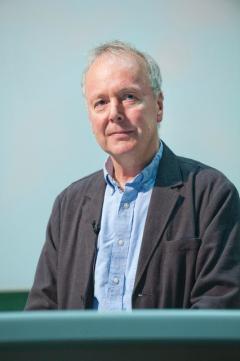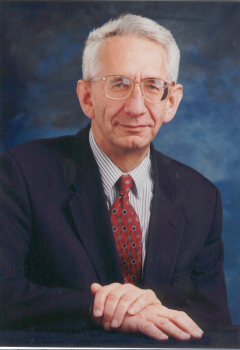Sir Adrian Peter Bird and Professor William Hill honoured by the Royal Society
Sir Adrian Peter Bird, Buchanan Professor of Genetics, and William Hill, Emeritus Professor of Animal Genetics have received prestigious medals from the Royal Society.
The Royal Society announces the winners of 2018 medals and awards today. The annual prizes recognise exceptional researchers who make outstanding contributions to science.
Three medals have been awarded to researchers from the University of Edinburgh, including two from the School of Biological Sciences.
Professor Adrian Bird

Sir Adrian Peter Bird CBE FRS FRSE, receives Buchanan Medal for his discovery that the protein MeCP2 can reverse the autism spectrum disorder Rett Syndrome, demonstrating that such neurodevelopmental diseases can be curable.
Rett syndrome is a rare genetic disorder, occurring mainly in females, that affects brain function, resulting in severe mental and physical disability.
His research has accelerated understanding of this disorder and demonstrates that advanced Rett-like symptoms in mice can be reversed by putting back a functional MeCP2 gene.
MeCP2 is one of many proteins that influences how the genome functions by reading signals on the DNA and changing the activity of genes. It is found at high levels within the brain.
Children deficient in the protein acquire serious neurological disorders, in particular Rett Syndrome.
Although some people with Rett syndrome may retain a degree of mobility and communication skills, most will be dependent on 24-hour care throughout their lives.
The results demonstrate that Rett Syndrome in humans might be treatable and has stimulated an international search for potential therapies.
Professor Bird’s lab, in the Wellcome Centre for Cell Biology, are engaged in this effort while also improving knowledge of MeCP2 function in the brain.
His wider research seeks to understand how the genome is regulated and uses a broad range of technologies to gain insights into the role of DNA modifications in health and disease.
I am delighted to receive the Royal Society’s Buchanan Medal in recognition of our group’s efforts to understand - and we hope eventually treat - this distressing disorder
Professor William Hill

Professor William (Bill) Hill OBE FRS, receives the Darwin Medal for his contribution to the understanding of the genetics of quantitative traits and response to selection.
The Darwin Medal is awarded for work of acknowledged distinction in evolution, population biology, organismal biology and biological diversity.
He is distinguished for his theoretical contributions to the study of population and quantitative genetics, particularly in relation to selection and farm animal improvement programmes.
Quantitative genetics is the study of the genetic mechanisms that control complex characteristics that show a wide spectrum of variation - such as height or weight.
These characteristics are determined by the combined action of many genes and the environment and are characterised using statistical methods.
The revolution in genetic mapping technology and genome sequencing is such that quantitative genetics is one of the fastest growing areas of biology.
Application of these tools and development of statistical methods to utilise them have led to an enormous increase in productivity of farm animals for food production.
There has been rapid genetic improvement of quantitative traits such as growth rate, reproductive rate, and feed conversion efficiency.
Professor Hill has made major contributions to the analysis of quantitative variation in populations and was the first to present formulae for the expected association of linked genes.
He is interested in what maintains variation in complex traits within populations, both the genetic and the environmental components, and in particular the role of mutations.
Much of his research is in collaboration with the Roslin Institute, SRUC, the animal breeding industry and related groups.
Professor Hill was elected a Fellow of the Royal Society of Edinburgh in 1979, a Fellow of the Royal Society (FRS) in 1985 and appointed OBE in 2004.
I am both delighted and flattered to receive this award from the Royal Society. I thank the University for accommodating me ever since I was a PhD student, over 50 years ago, and all my many colleagues, students and assistants for their advice, criticism, stimulation and assistance.

